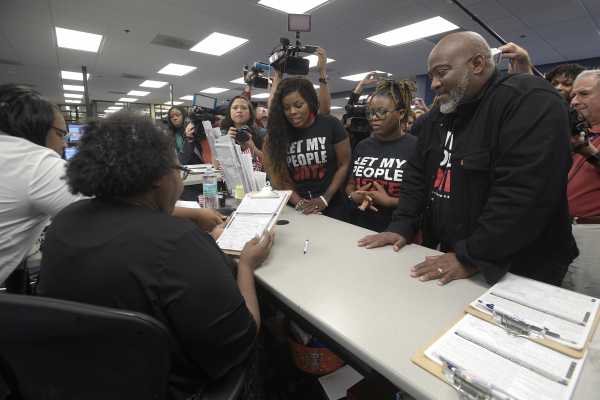
Last November, Florida voters passed a constitutional amendment that restored voting rights to more than 1 million people with felony records, one of the largest expansions of voting rights in decades.
Florida Republicans, however, are now trying to have a say in how the amendment is implemented — introducing bills that would likely make it harder for thousands to be reenfranchised, and fueling arguments that the state’s Republican lawmakers are trying to hamper the widely supported amendment.
Before passing the ballot measure, known as Amendment 4, with 65 percent of the vote last year, Florida was one of a handful of states that prohibited people with felony records from regaining their voting rights after serving their sentence. The state’s felony disenfranchisement rule dated back to the post-Civil War era — when it was passed in 1868, the rule explicitly intended to limit black voting power in Florida.
In recent years, Floridians who wanted to vote again had to petition a state parole board for the opportunity, a process that could take years and varied depending on who occupied the governor’s mansion. The state routinely rejected thousands of applications, leaving many people — a disproportionate number of them black — unable to vote.
Amendment 4, though, changed this by automatically allowing most people who had completed their sentences to register to vote, though those convicted of felony sexual offenses or murder were still barred.
Supporters of the amendment, which went into effect in January, say the ballot measure’s language clearly explains how voting rights should be restored, adding that the measure does not need any additional clarification from the state. The legislature, though, disagrees, and Republicans have introduced two bills that have kicked off a new fight over how the constitutional amendment should be implemented.
The two measures, one introduced in the state House, the other introduced in the state Senate, differ on many things, but Amendment 4’s supporters argue that both would reduce the number of disenfranchised people able to get their voting rights restored.
The most controversial measure so far has been the House proposal, which requires those with felony records to fully pay off all pay court fines and fees — including fees that were not imposed by a judge as part of their sentence — before they can regain their voting rights. The bill cleared its first hurdle on March 19 when it passed a House committee on a 10-5 party line vote. A committee is expected to vote on the Senate measure today.
Critics say the version of the bill currently in the House effectively functions as a modern-day “poll tax” — a reference to a controversial practice most notably used to limit the voting rights of African Americans. In Florida, advocates say many of the disenfranchised, a group that is disproportionately black and may lack employment or large incomes, would be unable to pay these costs. But Republican legislators argue that they are simply trying to clarify exactly who is eligible under Amendment 4, and how the measure will be carried out.
It’s sparked an intense debate over whether Florida’s Republican-led government is trying to halt the expansion of voting rights. The new House proposal “will inevitably prevent individuals from voting based on the size of the person’s bank account,” Kara Gross, a legislative director and senior policy counsel for the American Civil Liberties Union of Florida, told the Tampa Bay Times last week. “Those who have the financial means will vote, and those who can’t, won’t.”
Floridians voted to give people with felony records the right to vote again. Republican legislators want them to pay first.
Most of the backlash against the House proposal has centered on the fact that the measure would require people with felony records to pay any “financial obligation arising from a felony conviction,” even those not directly connected to their original sentence. In other words, a person could finish their sentence, but because they haven’t paid off the additional fees, they would be unable to vote.
This is a higher standard than what was previously required in Florida; under the old rights restoration system, a person only needed to finish paying restitution before they applied for their voting rights.
To understand why this is a problem, it’s helpful to explain how three things — court fines, restitution, and “user fees” — are different. Court fines (usually financial penalties assessed as part of the punishment for a crime) and restitution (usually a payment a defendant is ordered to give the victim of their crime) are usually handed down as part of a person’s sentence. There’s been a debate in Florida over if “user fees,” the various administrative costs tied to a person’s case moving through the justice system, are also connected to a sentence.
Amendment 4’s supporters argue that they are not.
Mark Joseph Stern sums it up this way at Slate:
Some of the groups that advocated for Amendment 4 say that a person should only be required to pay the amounts specifically mandated as part of their sentence before getting their voting rights back, and that people on payment plans should also have their voting rights restored. Others argue that money should not be a determinant of who is able to vote.
But both camps argue that adding in the other fees would make the costs of regaining voting rights extremely expensive for poor people with felony records, requiring them to spend years or decades paying back the costs before they could vote again.
“What the barriers proposed in this bill do is nearly guarantee that people will miss election after election … because they cannot afford to pay financial obligations,” Julie Ebenstein, a voting rights attorney at the ACLU, told NBC News. She has argued that the state should let people vote once they have finished their prison, probation, and parole sentences, and that they be allowed to continue paying the fines and fees after regaining their voting rights.
Navigating the labyrinth of fines and fees could be especially difficult in Florida, which has become so reliant on financial charges levied against people in the justice system that criminal justice reform advocates call the state one of the worst practitioners of “cash-register justice” in America. A 2010 analysis from researchers at the nonpartisan Brennan Center for Justice found that fines and fees have become a top source of revenue for the state, noting that “since 1996, Florida [has] added more than 20 new categories of financial obligations for criminal defendants and, at the same time, eliminated most exemptions for those who cannot pay.”
Earlier this year, WLRN, a local Florida news outlet, reported that more than “$1 billion in felony fines were issued between 2013 and 2018,” according to reports from a statewide group.
“Over that five year period, an average of only 19 percent of that money was paid back per year,” the report noted. Part of the problem, apparently, is that some of these unpaid fines and fees can be sent to debt collection agencies, which can add charges that significantly increase the amount a person owes.
But Florida Republicans have bristled at any assertion that they are acting unfairly, or are effectively levying a poll tax on voters. “To suggest that this is a poll tax inherently diminishes what a poll tax actually is,” Republican Rep. James Grant said last week.
Republicans argue that Amendment 4 needs additional clarification. Advocates disagree.
The stakes are high in this debate, as the outcome could limit the impact of one of the biggest voting rights victories in recent decades by reducing the number of people able to immediately register to vote. That impact could be especially significant for black Floridians, who make up a disproportionate number of those disenfranchised.
Vox’s German Lopez explained Amendment 4’s significance last year:
“At the end of the day, when a debt is paid, it’s paid,” Desmond Meade, president of the Florida Rights Restoration Coalition, one of the groups that campaigned for Amendment 4, told Lopez at the time. “We all want to be forgiven.”
But after Florida voters backed the amendment last year, Republican Gov.-elect Ron DeSantis and other party figures argued that the ballot measure was not clear, and that the legislature would need to work on “implementing language.” It led to complaints that politicians were looking to thwart the voting rights of a group of disproportionately black voters for political reasons. (While not every person disenfranchised before Amendment 4’s passage supports Democrats, a detailed report from Mother Jones’s Ari Berman cited data suggesting that many reenfranchised people would.)
While the debate over court fines and fees has attracted the most attention, advocates are also concerned about two other proposals that have been floated by Republican lawmakers.
In the House bill that recently cleared committee, lawmakers included language on how they wanted to define “felony sexual offenses,” one of the two classes of offenses that would bar a person from getting their voting rights restored. Those involved in the push for Amendment 4 say only people who committed “serious” offenses like rape and sexual assault should be affected by this, but the House’s proposal could widen that to include someone convicted of prostitution, or someone who sold adult content near a school. Republicans say they are simply relying on legal definitions of the offenses.
A Republican legislator has also floated a proposal that would expand the definition of “murder” — the second class of felonies left out of Amendment 4 — to include attempted murder. Advocates say the amendment is clearly written to only exclude those convicted of first-and second-degree murder, and that adding attempted murder to this group would be overly broad.
As Republicans push the House proposal forward and a state Senate committee prepares to vote on its own Amendment 4 bill, advocates say that legislators must respect the will of the majority of voters who supported the amendment in 2018. “We believe the people deserve better than partisan legislation determining who can vote in our state,” Meade and Neil Volz, both leaders of the Florida Rights Restoration Coalition, explained in a recent Tampa Bay Times op-ed.
Sourse: vox.com






